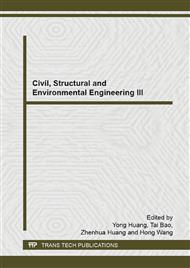[1]
He Y H, Hui C W. A binary coding genetic algorithm for multi-purpose process scheduling: A case study [J], Chemical Engineering Science, 2010, 65(16): 4816-4828.
DOI: 10.1016/j.ces.2010.05.032
Google Scholar
[2]
Shi H X. Solution to 0/1 knapsack problem based on improved ant colony algorithm [C], in: International Conference on Information Acquisition, 2006, 1062-1066.
DOI: 10.1109/icia.2006.305887
Google Scholar
[3]
Coelho L S. An efficient particle swarm approach for mixed-integer programming in reliability–redundancy optimization applications [J], Reliability Engineering & System Safety, 2009, 94(4): 830-837.
DOI: 10.1016/j.ress.2008.09.001
Google Scholar
[4]
Onwubolu G, Davendra D. Scheduling flow shops using differential evolution algorithm [J], European Journal of Operational Research, 2006, 171(2): 674-692.
DOI: 10.1016/j.ejor.2004.08.043
Google Scholar
[5]
Geem Z W, Kim J H, Loganathan G V. A new heuristic optimization algorithm: harmony search. Simulation, 2001, 76(2): 60-68.
DOI: 10.1177/003754970107600201
Google Scholar
[6]
Saka M P, Optimum design of steel sway frames to BS5950 using harmony search algorithm. Constructional Steel Research, 2009, 65(1): 36-43.
DOI: 10.1016/j.jcsr.2008.02.005
Google Scholar
[7]
M Mahdavi, M Fesanghary, E Damangir. An improve harmony search algorithm for solving optimization problems. Applied Mathematics and Computation 2007; 188(2) 1567-1579.
DOI: 10.1016/j.amc.2006.11.033
Google Scholar
[8]
Ayvaz M T. Application of Harmony Search algorithm to the solution of groundwater management models. Advances in Water Resources, 2009, 32(6): 916-924.
DOI: 10.1016/j.advwatres.2009.03.003
Google Scholar
[9]
Geem Z W, Lee K S, Park Y J. Application of harmony search to vehicle routing. American Journal of Applied Sciences, 2005, 12(2): 1552–1557.
DOI: 10.3844/ajassp.2005.1552.1557
Google Scholar
[10]
J H Kim, Z W Geem, E S Kim, Parameter estimation of the nonlinear Muskingum model using harmony search, Journal of American Water Resource Association, 2001, 37(5) 1131–1138.
DOI: 10.1111/j.1752-1688.2001.tb03627.x
Google Scholar
[11]
Geem Z W. Particle-swarm harmony search for water network design [J], Engineering Optimization, 2009, 41(4): 297-311.
DOI: 10.1080/03052150802449227
Google Scholar
[12]
Sharma K D, Chatterjee A, Rakshit A. Design of a Hybrid Stable Adaptive Fuzzy Controller Employing Lyapunov Theory and Harmony Search Algorithm [J], IEEE Transactions on Control Systems Technology, 2010, PP(99): 1-8.
DOI: 10.1109/tcst.2009.2039138
Google Scholar
[13]
Chia-Ming Wang, Yin-Fu Huang. Self-adaptive harmony search algorithm for optimization. Expert Systems with Applications, 2010, 37(4): 2826-2837.
DOI: 10.1016/j.eswa.2009.09.008
Google Scholar
[14]
Omran M G H, Mahdavi M. Global-best harmony search [J], Applied Mathematics and Computation, 2008, 198(2): 643-656.
DOI: 10.1016/j.amc.2007.09.004
Google Scholar
[15]
Zou D X, Gao L Q, Wu J H, Li S. Novel global harmony search algorithm for unconstrained problems [J], Neurocomputing, 2010, 73(16-18): 3308-3318.
DOI: 10.1016/j.neucom.2010.07.010
Google Scholar


